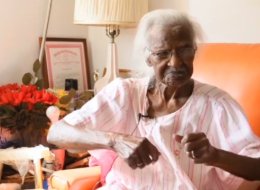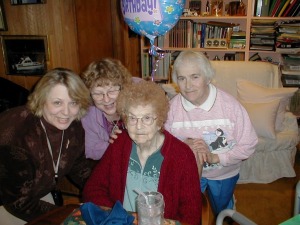Changes in memory become normal as people become older, but memory loss that interferes with daily life is not normal. It may, in fact, be a case of mild to moderate Alzheimer's disease. That's why getting a proper mild to moderate Alzheimer's diagnosis is the only way to know.
There is no single test that will diagnose mild to moderate Alzheimer's disease. In order to diagnose mild to moderate Alzheimer's disease, your loved one's doctor must rule out other possible causes of symptoms, such as forgetfulness. A complete evaluation helps determine whether mild to moderate Alzheimer's disease is the cause of a person's symptoms.
The healthcare professional may:
- Carry out a complete physical exam
- Take urine or blood samples, or both
- Carry out memory and psychological tests to see how well the brain is working
- Order a brain scan (like a computerized tomography scan)
Is It Just Old Age or Is It Mild to Moderate Alzheimer’s Disease?
How do you know if it is mild to moderate Alzheimer's disease? As people get older it's common for them to forget things. But at what point is misplacing your car keys considered old age or something worse? Old age can often result in memory loss, whereas mild to moderate Alzheimer's disease can cause loss of cognition, which includes things like memory, understanding, communication, and reasoning.
Mild to moderate Alzheimer's Disease Symptoms. Here is a checklist of common symptoms to help recognize the warning signs of mild to moderate Alzheimer's disease:
Memory Loss and Mild to Moderate Alzheimer's Disease
Forgetting recently learned information is one of the most common early signs of mild to moderate Alzheimer's disease. A person begins to forget more often and is unable to recall the information later.
What's Normal Aging? Forgetting names or appointments occasionally.
Difficulty Performing Familiar Tasks Because It Could Be Mild to Moderate Alzheimer's Disease
People with mild to moderate Alzheimer's disease often find it hard to plan or complete everyday tasks. Individuals may lose track of the steps needed to prepare a meal, place a telephone call, or play a game.
What's Normal Aging? Occasionally forgetting why you came into a room or what you planned to say.
Problems with Language May Be a Sign of Mild to Moderate Alzheimer's Disease
People with mild to moderate Alzheimer's disease often forget simple words or substitute unusual words, making their speech or writing hard to understand. They may not be able to find the toothbrush, for example, and instead ask for "that thing for my mouth."
What's Normal Aging? Sometimes having trouble finding the right word.
Disorientation to Time and Place Due to Mild to Moderate Alzheimer's Disease
People with mild to moderate Alzheimer's disease can become lost in their own neighborhoods, forget where they are and how they got there, and not know how to get back home.
What's Normal Aging? Forgetting the day of the week or where you were going.
Poor or Decreased Judgment Due to Mild to Moderate Alzheimer's Disease
Those with mild to moderate Alzheimer's disease may dress inappropriately, wearing several layers on a warm day, or little clothing in the cold. They may show poor judgment about money, like giving away large sums to telemarketers.
What's Normal Aging? Making a questionable or debatable decision from time to time.
Problems with Abstract Thinking–Is It Mild to Moderate Alzheimer's Disease?
Someone with mild to moderate Alzheimer's disease may have unusual difficulty performing complex mental tasks, like forgetting what numbers are and how they should be used.
What's Normal Aging? Finding it challenging to balance a checkbook.
Misplacing Things–a Sign of Mild to Moderate Alzheimer's Disease
A person with mild to moderate Alzheimer's disease may put things in unusual places: an iron might go in the freezer or a wristwatch in the sugar bowl.
What's Normal Aging? Misplacing keys or a wallet temporarily.
Changes in Mood or Behavior in Mild to Moderate Alzheimer's Disease Patients
Someone with mild to moderate Alzheimer's disease may show rapid mood swings – from calm to tears to anger – for no apparent reason.
What's Normal Aging? Occasionally feeling sad or moody.
Changes in Personality Due to Mild to Moderate Alzheimer's Disease
The personalities of people with mild to moderate Alzheimer's disease can change dramatically. They may become extremely confused, suspicious, fearful, or dependent on a family member.
What's Normal Aging? People's personalities do change somewhat with age.
Loss of Initiative Due to Mild to Moderate Alzheimer's Disease
A person with mild to moderate Alzheimer's disease may become very passive, sitting in front of the TV for hours, sleeping more than usual, or not wanting to do usual activities.
What's Normal Aging? Sometimes feeling weary of work or social obligations.
The Stages of Alzheimer's Disease
It can be confusing not knowing what to look for when your loved one shows possible symptoms of mild to moderate Alzheimer's disease, especially because it can affect everyone differently. Some people may not have every symptom, while for others, their symptoms may occur at different times. Since Alzheimer's disease can last as long as 20 years, it can be helpful to look at it in terms of stages. Knowing the stages can help give you a general idea of what to expect and how to provide care.
Unfortunately, mild to moderate Alzheimer's disease may bring about changes in your family member's overall functioning. Scroll down to find information about the changes you might expect at the mild and moderate stages of Alzheimer's disease and some suggested steps you can take to cope with these changes.
Mild Stage Alzheimer's Disease
Most people at this stage can still manage many of their daily activities themselves, but they may need some assistance or support to stay organized.
Possible Changes:
- Having trouble carrying out tasks that require multiple steps, like following a recipe
- Getting lost, even in familiar places
- Having difficulty performing some household chores
- Avoiding social situations
- Having trouble remembering appointments, people's names, or things that happened recently
Steps the Caregiver Can Take:
- Ask a trusted friend or family member to help manage your loved one's money
- Write reminders to your loved one in the same place, such as a calendar or notepad, to look at often
- Keep a list near the telephone of the names and telephone numbers of family and friends, along with their photos
- Put labels or pictures on cabinets, drawers, and closets so that things can be found easily
- Encourage your loved one to talk about his or her feelings with friends, family, clergy, or other professionals
- Consider enrolling your loved one in adult education, recreation, or fitness classes to stay physically and mentally alive
Moderate Stage Alzheimer's Disease
People at this stage may have more trouble taking care of themselves, but they can still be involved in their daily care and follow a comfortable routine.
Possible Changes:
- Needing help to take a bath or shower, choose clothing, or get dressed
- Needing help setting a table or getting out of a chair
- Developing sloppy table manners
- Feeling restless or wandering, especially in the late afternoon or evening
- Getting suspicious, angry, or easily upset
- Having trouble recognizing family members
- Having difficulty expressing oneself and understanding others
Steps the Caregiver Can Take:
- Encourage your loved one to stay involved in things he or she enjoys doing, even if for shorter periods of time
- Help your loved one share his or her memories with family members by telling stories or creating a scrapbook
- Speak calmly and clearly – show what you mean as you say it by making sure you have your loved one's attention
- Plan for exercise and other physical activity during the day to promote sleep at night
- Research community resources to provide help, such as home healthcare agencies or adult day centers








